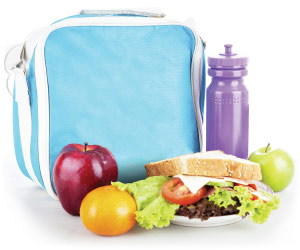Snacking at School
How to Protect Your Child’s Teeth and Promote Good Nutrition
Dear Doctor,
I am concerned that my child is not getting good nutrition during the school day. What can I do?

Dear Susan,
Many parents work hard to provide healthy food choices at home, only to find that their kids succumb to unhealthy temptations during the school day that put general health — and teeth — at risk. A large part of the problem is the selection of unhealthy snacks and drinks sold on school property either in vending machines or snack bars. You can help combat this in a variety of ways.
But first, some good news: New regulations from the U.S. Department of Agriculture (USDA), called the Smart Snacks in Schools initiative, will go into effect for the 2014-2015 school year. The new rules set minimum nutritional standards for snacks sold on school grounds and are designed to promote consumption of more whole grains, fruits, vegetables and low-fat dairy products while limiting calories, fat, sugar and salt (sodium).
In announcing these rules, the USDA noted that one third of American children are at risk for preventable diseases such as diabetes and heart disease because they are overweight or obese. The new standards will help combat this, but, as a dentist, I am also concerned they do not do enough to safeguard dental health. For example, sugary chocolate milk that promotes tooth decay can still be sold as long as it is fat-free. Also, highly acidic diet beverages that erode tooth enamel despite being sugarless will still be allowed in high schools. These include sodas, ice tea, sports drinks and so-called “energy” drinks (that also contain high amounts of caffeine), all of which are also bad for children’s health.
If your community schools are selling snacks and beverages that you do not think are healthy, speak to or write to your school officials along with other parents who feel the same way.
The bottom line is that parents are ultimately responsible for ensuring that their children make healthy food and beverage choices. How can you do that?
Get Involved. Many schools across the country have stricter rules than those contained in the USDA Smart Snacks initiative, which is only intended as a minimum anyway. If your community schools are selling snacks and beverages that you do not think are healthy, speak to or write to your school officials along with other parents who feel the same way. You can also suggest that your local schools turn off vending machines right before lunch, as some districts do.
Set Limits. Make sure your children understand what they are allowed to buy at school and why. Help them understand that obesity and serious diseases that can shorten a person’s life expectancy — including heart disease and diabetes — actually start in childhood with the consumption of too much sugar and unhealthy foods. If you don’t think your kids can spend snack money responsibility, provide them with healthy snacks to take to school instead.
There is overwhelming scientific evidence that sugar is the most important dietary factor causing tooth decay, and soft drinks are the highest source of consumption.
Get Creative. Send your kids to school with munchies that satisfy without resorting to sugary snacks. Healthy snacks don’t have to be boring. You can jazz up unbuttered popcorn with a dash of cinnamon or parmesan cheese. Using a cookie-cutter to shape whole-grain bread and real cheese into flowers and stars can make healthy foods more enticing than prepackaged, processed “cheese food” and crackers. Kids also enjoy naturally sweet and colorful bite-sized fruits and vegetables like seedless grapes, baby carrots and cherry tomatoes, and even nuts. Don’t forget the Greek yogurt, low-fat salad dressing, hummus and/or all-natural peanut butter (which does not contain added sugar or hydrogenated oils) for dipping!
A Word About Teeth And Snacking
There is overwhelming scientific evidence that sugar is the most important dietary factor causing tooth decay, and soft drinks are the highest source of consumption. Foods containing added sugars also significantly increase risk for decay, especially when added to already starchy foods such as biscuits, cake and breakfast cereals. On the other hand, natural sugar contained in whole fresh fruits, vegetables, and starch-rich staple foods (bread and rice for example) are not as harmful to teeth, and are good for healthier snacks. Consider sticky sweet fruits like dates and raisins to be more like candy and limit them to special treats.
Frequency is important too. One snack to tide a child over to lunch or dinner is OK, but “grazing” — i.e., nibbling all day — is a bad habit to get into. Carbohydrates break down into sugars in the mouth, and sugars feed bacteria. Bacteria release acid that breaks down teeth and causes cavities. Saliva, the mouth’s natural acid-neutralizer takes 30-60 minutes to work, so a snack every hour can mean your child’s mouth is continually acidic and more prone to tooth decay.
Start teaching your kids healthy habits when they are young — and model healthy snacking behavior yourself — so they will at least have a basic understanding of nutrition, oral health, and what you expect of them. Studies show that age-appropriate nutrition education actually does result in kids making better decisions. It’s up to you to show them the way!




